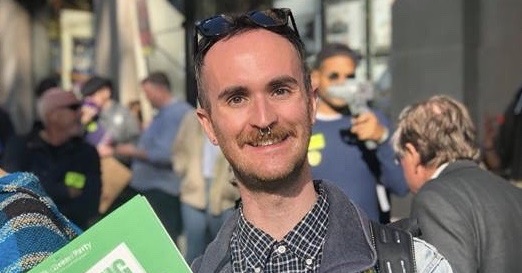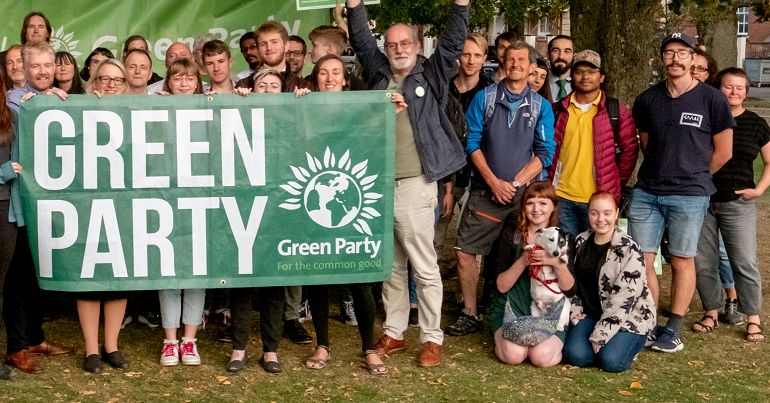Interview with Liam McClelland – GPEx policy development coordinator candidate

Throughout August, members of the Green Party for England & Wales will be voting to elect members of the next Green Party Executive (GPEx). In all, members will vote to determine which representatives will carry out eleven different roles – including that of leader and deputy leader. There is also a ballot to determine who will be the party’s third member in the House of Lords should the party be asked to put forward another peer.
Former Young Greens co-chair Liam McClelland is standing for policy development coordinator. This August, she’ll be going up against Mick Gregg, Vix Lowthion and the job share team of Peter Sims and Sam Alston.
We asked each of the candidates five questions on their background and what they would seek to achieve on GPEx. Here are Liam’s responses:
What do you think are the main challenges currently facing the Green Party, and how would you work to overcome them?
I think the biggest challenges facing the Green Party and huge sections of our society is an 80 seat Conservative majority and perhaps the legacy of ‘Unite to Remain’ that contributed to this. We are already seeing the anthropomorphism and prioritisation of the Economy over people with this governments proposed recovery from lockdown and the current global pandemic and recession we are facing.
Friday’s for Future and the Youth Strikes for Climate have done more to bring the conversations about Climate Change and what we need to be doing to combat them to mainstream discourse than the Green Party has done since 1985. Extinction Rebellion and Beyond Politics are also competing to our voter base and airtime to discuss these important environmental issues. Some of their actions (attacking Friends of the Earth offices and blocking public transport from working class areas) have alienated the wider public. We must show why we are still relevant and different and learn from these youth movements and wider protest groups.
To do this I think we must win over young people and marginalised communities to vote for us. It’s therefore concerning that the Young Greens and Equality and Diversity from the Political Executive that will replace GPEx.
What skills do you bring that would make you an effective member of the executive?
I already have experience as a member of the executive, having served during both local and European elections. Whilst a member of the executive I constantly spoke up and championed the views and voices of young and marginalised voices. Often speaking up in support of members of the executive with lived experience or expertise in areas that were being discussed who were being silenced or spoken over by other members. I also have a lived experience by belonging to a number of liberation groups that is often lacking from our party’s governance structures. From being reliant on government disability and welfare benefits, coming from a working-class background, and living with multiple disabilities.
I also bring great listening skills, empathy, being connected to a wide number of people who live outside of the green bubble, abstract thinking, I try to remain teachable and open to learning new concepts and ideas from those with more experience or expertise than I have, I am also not afraid to admit if I don’t know something or I have gotten something wrong.
What background do you have in the Green Party’s policy development process?
The experience I have withing the Green Party’s policy development process is from being a core member of the Drugs policy working group. During this time I worked on presenting drugs policy to the executive and to local parties, running workshops on drugs policy at conference and at the Green Party’s PolicyFest, researching key parts of the policy and meeting with experts outside the party to help provide evidence based research to certain short-term aims. Working with experts outside the party too. Within the Young Greens I am an alumni of their 30 under 30 training and development where we had a training weekend on policy development. From this I worked on bringing a record of policy statement (RoPS) to conference. Unfortunately due to the time spent discussing the Holistic Review this motion fell off the agenda and was not heard. To bring this RoPS to conference I went through the accreditation process and understand the importance and also difficulties in using this process. I would also like to improve the accreditation process.
How would you strengthen the Green Party’s policy development process?
If elected, I would make sure we adopt the Scottish Greens policy pages approach. This means we would have a brief synopsis of our policies on a public facing web page, and then in-depth short and long term aims on our members page. I would start with a skills audit of the policy development committee. Then I would set about co-opting a further 5 members with appropriate skills (the total allowed to make up a committee). This would ensure we have the skills to support our members in policy development.
Many of our current policies are out of date and cause problems for the party when the press picks up on them. We need to, see when they were last updated, and what has changed in scientific understanding since. It’s my aim to ensure all our policy is evidence based. I would then look to utilise the studio space we have available with YouTube to provide effective and accessible online learning for members wishing to form policy working groups. This is likely to be needed should PolicyFest have to be organised online. I have over 10 years’ experience within the hospitality industry so organising an event like this would be straight forward. I would also like to see the role of Policy Development Coordinator to start including policy implementation, supporting our elected councillors and representatives in bringing forward Green Party policies to their local authorities.
What is your favourite Green Party policy? What is your least favourite?
My favourite policy and the policy that helped me make my decision to join the Green Party back in 2015 was the Education Policy, this remains my favourite. I believe most of our policy that has been developed by our members has had the betterment of society and the protection of the environment in mind. My least favourite is our outdated or not currently updated polices. The amount of time that passes between reviews and updates of our policy needs to be shortened by implementing periodic reviews of all our polices. Scientific understanding and advancements in technology continue to change and we must ensure that our polices that touch on these areas continue to be updated alongside them.
This interview is part of a series with each of the candidates in this year’s GPEx elections. You can find Bright Green’s full coverage of the elections here.
PS. We hope you enjoyed this article. Bright Green has got big plans for the future to publish many more articles like this. You can help make that happen. Please donate to Bright Green now.



Leave a Reply